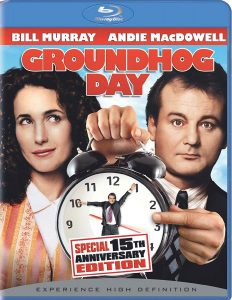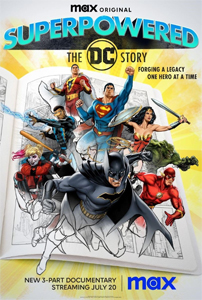“Superpowered: The DC Story” (Max) is one of those documentaries that aims for the illusion of telling “both sides of the story” by acknowledging another side exists but only focusing on its own side. It’s a soft, inoffensive DC Entertainment shill piece that successfully shows the comic company’s rich history, but it raises issues more so than digging into them.
Over three one-hour episodes, “Superpowered” chronicles “The Hero’s Journey” (the invention of the Big Three in the Thirties and Forties), “Coming of Age” (the disastrous Comics Code era through the “Superman” and “Batman” movie rejuvenations) and “A Better Tomorrow” (21st century projects, with an emphasis on diversity a mild admission of the decline in comic sales).
Making the old new again
The series’ biggest success is in its production, as it makes history seem fresh. Everything looks new, thanks to expert remastering of clips from the likes of Sixties “Batman” and Seventies “Wonder Woman.” They look as vibrant as scenes from the last decade’s “Arrow” and “The Flash” (produced by Greg Berlanti, who also produces this documentary and is an interview subject).
Narrated by an uninvested Rosario Dawson (a Batgirl voice actor), “Superpowered” is open about the good things DC has done. For the bad things, it pays lip service. It softens the infamous Siegel and Shuster saga (wherein Superman’s naïve creators sold their cash cow for a pittance) by noting that they were the highest-paid writers and artists of their day. Of course, it doesn’t give us numbers.
For documentaries without a built-in agenda, I’d recommend 2017’s “Secret History of Comics” episodes on Wonder Woman, Superman and Milestone Comics, plus the 2017 documentary “Batman & Bill.”
Corporate perspective
“Superpowered” is the type of documentary where a corporate head will note that the layoffs of 2015 before DC moved from New York to Hollywood were the toughest thing she ever had to do. But we get no soundbites from anyone laid off from DC; I’m confident that no such people were even interviewed.
When modern comics are explored toward the documentary’s end, it mentions the changing of Superman’s “… the American way” to “… a better tomorrow” and then bombards us with clips of Fox News’ conservative pundits ripping DC. Apparently it’s to make this huge corporation look like some sort of noble underdog?
Fortunately, “Superpowered” doesn’t generally treat the viewer like a malleable target, but it achieves an odd shallowness even if its timeline covers 90 years. When the documentary does present surprising points of view, it doesn’t delve deeper.

For instance, Patty Jenkins calls Wonder Woman an “everywoman,” a fascinatingly unusual take, but the interviewer doesn’t ask her to elaborate. The Rock, who plays Black Adam on screen, says he’s always been drawn to DC because “it has edge.” That’s also a surprising take, even if he is only comparing DC to Marvel. Again, no follow-up question. (A deeper look into, say, “Watchmen” could support the “edgy” argument. But “Watchmen” is instead featured in a section on minority narratives, emphasizing the 2019 TV continuation.)
Intriguing tidbits
While it’s a given that brief quotes from Jason Momoa and Gal Gadot can be smirked at (now imagine if Chris Evans or Robert Downey Jr. popped up praising DC – that would be a get!), the real gems among interviewees are the comic creators and industry experts. They speak about the meaning and importance of narratives and industry sea changes.
One intriguing point is the emergence of trade paperbacks in the Eighties as a catalyst for giving comic narratives a permanence they didn’t previously enjoy. Another enlightening side trip is the part about Milestone Media, a branch of DC that focused on black characters in the Nineties but was canceled. The documentary presents no theory about why Milestone failed (It has since been resurrected).
It’s gotta be worrisome to fans (and refreshing for people who are sick of the superhero craze) that a documentary by DC about DC is short on hope about future projects. It notes that DC is currently “at a crossroads” and hints at declining comics readership, but doesn’t present any reasons for excitement about what’s to come. Jim Lee makes the interesting argument that Berlanti’s shows have the audience that comics used to have, but posits no theory about the lack of synergy (Why in the world don’t “Flash” TV fans buy the “Flash” comic?).
For all its missed opportunities, “Superpowered” is extremely watchable as slick entertainment, filled with catnip for casual superhero comic fans. We can say “Hey, I know some of this history!” Give me a section on “Superman” 1978 and I want to watch “Superman” 1978. Give me a mention of “Supergirl” 2015 along with some exciting footage and I temporarily think “Hmm, maybe I should give it another chance.” The section on Harley Quinn makes me want to binge all Harley Quinn materials.
DC cinema magic boosts a DC documentary better here than in a more slapdash corporate piece, 2013’s “Necessary Evil: Super-Villains of DC Comics.” In fact, I’d rather watch these three hours than a lot of three-hour superhero movies. But like even the best films of from recent years, a viewer is consuming a sugary desert more so than a nutritious meal.

